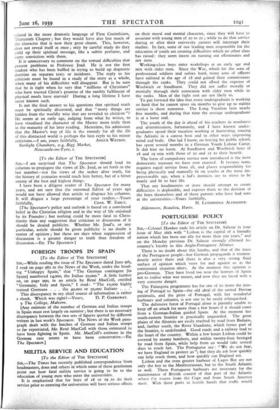[To the Editor of THE SPECTATOR]
Sut,—Professor C. E. M. Joad's article on this subject is further evidence of the fact that a writer may possess dis- tinguished literary gifts and still be unable to appreciate the merits of a great book. The character of the Four Gospels can only be understood when it is remembered how they came to be written, and the fact that they have been trans- lated almost verbally into another language. Almost certainly the original accounts of the earthly ministry of Jesus and His sayings were recorded by men who claimed no literary gifts ; they were the impressions, noted long after the events described, of Disciples who had actually shared in them. Some of the passages have a wonderful beauty all their own ; as, for example, the Fifth Chapter of Matthew (to which Professor Joad specially refers) and Chapters Fourteen and Fifteen of John, which were almost certainly written long after the death of Jesus. All the records as a whole bear evidence that they are the rather disconnected recollections of Disciples who had recorded the memories that must have impressed them of a life that they felt, was increasingly wonderful the more they tried to understand it.
The fact that makes the record an imperishable and altogether beautiful one is the Personality that is gradually revealed through it. One feels as the story unfolds that here is a wisdom beyond all earthly interpretation, and the stark simplicity with which the story is told adds to its dramatic impressiveness.
The question to ask about it all is not " what is the literary quality of the story? " but " does it .bear the evidence of truth on the face of it? " If Professor Joad reads the Four Gospels expecting to find in them the majestic music of some of the more memorable of the Psalms, he will be disappointed ; but even in the English translations of the New Testament there is surely a simple beauty of language that cannot easily be matched by any other narrative. Had Paul written the Gospels, they would no doubt have been
related in the more dramatic language of First Corinthians, Thirteenth Chapter ; but they would have also lost much of the character that is now their great charm. This, however, does not reveal itself at once ; only by careful study do they yield up their spiritual message, like a subtle perfume, and carry conviction with them.
It is unnecessary to comment on the textual difficulties that present problems to Professor Joad. He is not the first student who has been baffled in trying to build up dogmatic doctrine on separate texts or incidents. The reply to his criticism must be found in a study of the story as a whole, when many of his difficulties will disappear. But is he sure that he is right when he says that " millions of Christians" who have trusted Christ's promise of the earthly fulfilment of physical needs have starved? During a long lifetime I have never known such.
Is not the final answer to his questions that spiritual truth must be spiritually discerned, and that " many things are hidden from the worldly wise that are revealed to children "? He seems at an early age, judging from what he writes, to have visualised the character of the Master more truly than in the maturity of his later reading. Meantime, his admission that the Master's way of life is the remedy for all the ills of this distracted world is perhaps the best reply to his minor
criticisms.—I am, yours faithfully, ANGUS WATSON. Sunlight Chambers, 2-4, Bigg Market, Newcastle-on-Tyne, 1.























































 Previous page
Previous page